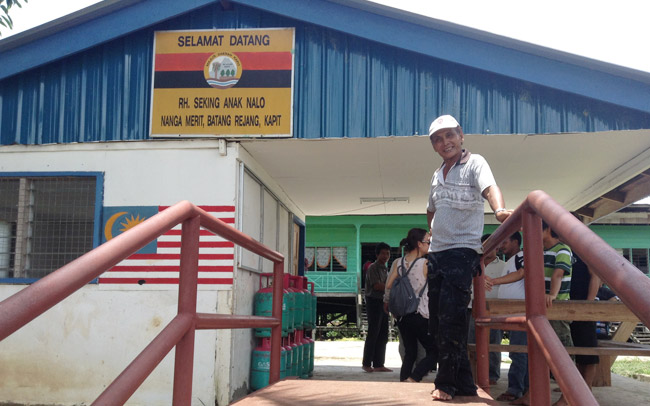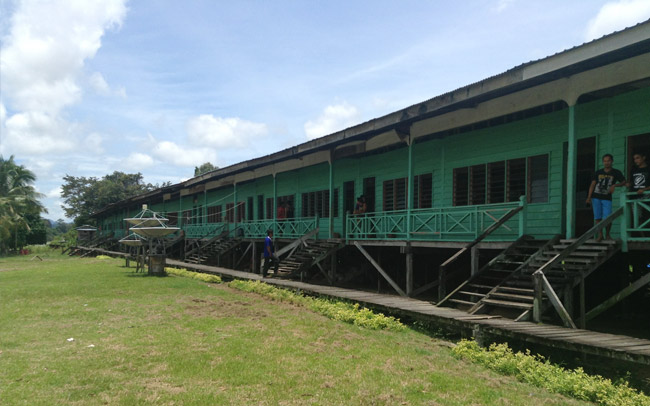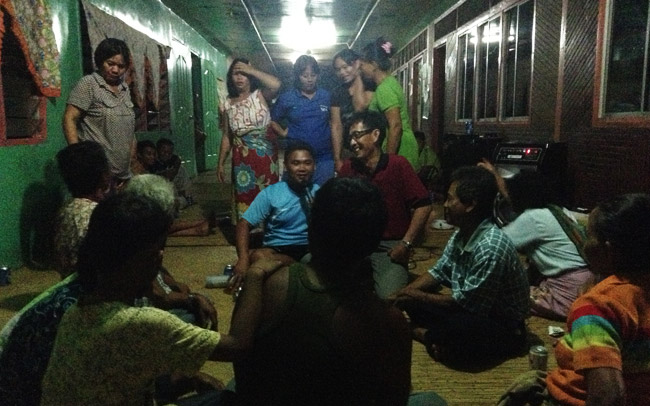 KUCHING: The children screamed with glee as they chased each other in the dirt; while older boys played sepak takraw, flipping skillfully as they performed bicycle kicks.
KUCHING: The children screamed with glee as they chased each other in the dirt; while older boys played sepak takraw, flipping skillfully as they performed bicycle kicks.I watched the young Dayaks— almost all of them from a dwlinding ethnic minority called the Begatans— enjoy themselves as I leaned on the wooden railings of the longhouse where I was to stay the night.

This longhouse was called Nanga Merit, in the rural interiors of Kapit in Sarawak: a place only reachable through the Rajang river.
My mind flashed back to the first three-hour express boat ride from Sibu to Kapit town and another couple of hours for me and my cameraman, Fitri, to reach here.
I remember the roaring, rolling waters of the dangerous Pelagus rapids; and how my hair stood on ends when the boat driver cheerfully announced: “Oh, quite a number of people have died in these waters here! Let’s wear our safety vests now.”

Back at the longhouse where the children ran alongside their canine companions, I wondered outloud: “Don’t these kids need to be at school?” It was still quite early in the afternoon.
“Well, to be honest, only about half of them go to school these days,” my host, Aman, replied me with an almost apologetic look. With a sigh, Aman explained that this is partly due to the parents. For them, it makes more sense to encourage their children to follow them to the logging camps, or work in the plantations or paddy fields, to help with work.
“All my children finished school though,” he told me proudly. (Unsang Anak Jelani, a school principal here, told me he often looked for missing students who skipped school. It was a mentality, rather than a monetary, issue, he told me.)
Aman is the son-in-law of the area’s Penghulu and as one of the leaders of this community of 40 over ‘pintu’ (doors) longhouse families, he is slightly more cautious about saying something negative to a journalist such as myself.
But he was no less welcoming as a host: I was constantly offered drinks and food by him and the new friends I made here. They say that a longhouse is never short of hospitality, and they are right: I never grew too thirsty or hungry.

My assignment was about Malaysia Day, but this is date quite foreign to most of them. And who can blame them?
“Nothing special, it’s just normal every day. I sit here and I don’t do any jobs anymore, it’s been a very hard, very hard, but I’m good, I have my grandchildren,” a chain-smoking, stoned-looking 70-something man told me.
Doring Anak Jigut flashed me a smile and poured me some tuak as we ended the short interview. How do you ask people the significance of Malaysia Day or Merdeka when their simple daily lives revolve around jobs like farming, and sometimes hunting, and helping big logging companies. There are no national celebrations in this part of Malaysia.
“I don’t know what is September 16 or July 22 or whatever, but yes, my parents always told me about 31 August, it’s an important day. It’s Merdeka!” Steven Spedo told me.
The 43 year old machine operator had eight children, one of them adopted. I asked how he managed such a big family. “It’s what we do,” he said. “Of course my salary is not enough, so I do other work, I follow my Semenanjung friends who tell me there are ways to earn more money.”
Apparently adopting children was quite common, alongside intermarriage among different races and religions in the longhouses. They seem to live together, Christians and Muslims, Ibans and one Chinese, quite well.
It was quite a cozy place, a long house. In the day time, everyone would sit at the 'Ruai', the stretch of communal area typical of such structures, and share stories. Everyone wanted to talk to me even as I sat crosslegged on the mat.
This was a longhouse with flourescent lights and fans and satellite TV, but those, I found out, were luxuries which only worked at night.
“We only start up our generator in the night, about four hours maybe between six to 10. We don’t waste electricity in the morning,” one resident explained to me.
The generators in each house run on diesel and the costs of this nightly ritual costs RM400. Not cheap. When night came, there were a few houses that remained dark. “Those families did not have enough for this month,” explained another new friend.
If electricity was a luxury, what about water? What about telephone lines?
A science teacher in the primary school across the river bank summed up the lack of infrastructure in this parts for me quite well: “We live in the interiors… and in terms of communication, we are cut off from the outside world.”
“There are no telephone lines, and no roads to better connect us,” said Gudang Anak Kemarau, a local Iban who spent 13 years as a teacher here.
“Remember the express boat accident in Belaga? Now that makes everyone very jittery. They wonder if there are any other way to travel other by water,” he said.
“Water is a also problem.. we only get water from the heavens, we build a tank and drink rain water. If during dry season, there is none. We don’t filter it. We boil it first lah. Now it’s better, because we take pipe water, filtered from Rejang river.”
Late in the last of my last night staying at Nanga Merit, I joined in the fun as the Begatan folk here celebrated a wedding with a party. Boy, do these folk know how to have fun.

As I closed my eyes in the express boat ride back to Sibu, I thought how rural folk can be so happy and content, despite each and everyone of them knowing that their lives were simple in comparison with those who lived in the big cities, like myself.
I felt silly asking if July 22, Aug 31, and Sept 16 felt special for them, whether they had a sense of pride or patriotism to those dates.
With Malaysia reaching 50 years today, there are those who would remind the ruling government how backward those living in Sabah and Sarawak still were. But I bet if you ask any longhouse folk, they would take these shortcomings in stride, and without a sense of bitterness, and reply: “That’s just how we live!”





